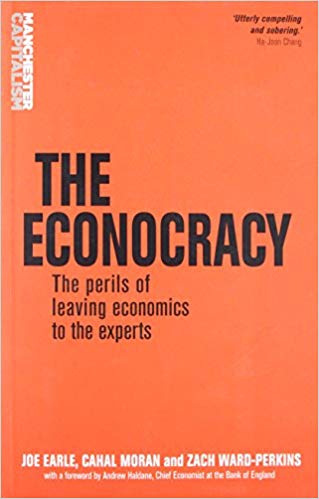If Britain shares a characteristic with the EU it is the capacity to muddle through with a fudged compromise. So I, like most people, expected Brexit to go that way. But after last night’s vote in the House of Commons against the government’s negotiated deal with the EU, I now don’t think that is likely. Like many English people I have underestimated the capacity of Irish politics to impinge on those of Britain.
Why? Let’s think of the possible ways forward. Apart from a no-deal these might be a referendum, a new deal based on a full customs union, or a new deal without the so-called Irish backstop. Last night’s vote showed how none of these are viable.
So why did the government’s deal fail so badly? Firstly the official opposition united against it. The SNP, the Lib Dems and the Green MP all hope for a referendum to end Brexit entirely. They voted the deal down to clear space for that. Labour voted against it so as to keep its options open: the leadership’s main aim is to take power, and to do so it would rather not take up a firm view on Brexit which could alienate a large chunk of its supporters. To the official opposition were added more than 100 MPs from the Conservatives and the DUP. A small number of these (no more than a dozen) are holding out for a referendum. The rest are hard Brexiteers who either do not want any kind of a deal, or who took exception to the Irish backstop.
The Irish backstop is key. The deal as a whole is the combination of a hard legal withdrawal agreement, and a soft political statement of intent about future relations. Alas the backstop, designed to ensure that the border between the north and south of Ireland remains open, is part of the former. Hard Brexiteers seem to think it is a Trojan horse which will allow the EU to impose a customs union on the UK against its wishes indefinitely. Personally I think that’s nonsense: the only way that the UK can stay in the customs union indefinitely is if that is what Parliament wants. Political reality trumps international law. But reason has never had much to do with politics.
What kind of new deal could be negotiated to replace the current one? Not that the EU side will admit that any kind of new deal will be allowed. One option is to build a commitment to the customs union (and single market) into the political part of the agreement, an option referred to Norway plus, because of its similarity to the Norway’s current status (though Norway is not part of the customs union, as it happens, and there are border checks on the Swedish frontier). That would render the backstop harmless or redundant. There are some Conservatives who favour this, but most dislike this approach even more than the current deal, because it would mean no independent trade policy, and freedom of movement for EU citizens. To be viable such an approach would need Labour to get behind it, and even then it would struggle. In fact this approach seems close to the sort of deal that the Labour leader, Jeremy Corbyn, says he wants. But there is no chance that Labour will play ball. The party is in fact very divided and any move to favour any particular solution would open up those divisions and prop up the hated Tory government at the same time. It is hard to see that such a deal could command many more votes in parliament than the 202 that the current deal got.
Hard Brexiteers, like the DUP spokesman and Boris Johnson, the former Foreign Secretary, that I saw being interviewed last night, have another idea. The EU will blink at the prospect of a no-deal and make the Irish backstop go away. That raises two questions: could the EU do this? And if they did, would there be a parliamentary majority for it? The answer to the first question hinges on the Irish government. If they were prepared to retreat on the issue, the rest of the EU would take their lead. But if they didn’t want to, then I don’t think the other EU governments couldn’t or wouldn’t force them too. And this is where I may have got things wrong in the past. The impact of a no-deal could be even worse for the Irish Republic than for the UK; and it would not help keep its border with the north open – so I assumed the Irish would prove flexible in the end. But the Irish prime minister, Leo Varadkar, seems prepared to endure a no-deal rather than cave in to the British. English Brexiteers affect a strange combination of idealistic fervour for national sovereignty with an easy-going realpolitik that assumes that other governments will fall in line because that is in their economic interests. But there are red lines in Irish politics that are not susceptible to realpolitik. The DUP is demonstrating this for the northern Unionist community. For the Irish republic caving into the British interests is another such red line. They will blame the mess on both the British government and the DUP.
But even if the Irish did back down, would that be enough to save the deal? It might add about 70 votes to the government tally when it needs 115. It would not be enough to satisfy a core of no-dealers, and neither the referendum supporters. It would need a number these, together with some opposition MPs, to shift out of desperation. This is such a long shot that Mr Varadkar is unlikely to budge, lest he gets the worst of both worlds: a retreat that fails.
And what about a further referendum? If parliament is as stuck as it is, it might seem logical to put it back to the people. Leaving aside the difficulty of what question to ask, and how many options to offer, I don’t think it will be possible to get a parliamentary majority for it. For all the smooth logic put by the idea’s supporters, a further referendum would be seen as a betrayal by most Leave voters. The repercussions would be terrible for both main parties. The leadership of neither will throw their weight behind it, which means that it would struggle to get many more than 200 votes in parliament.
Could the withdrawal date of 29 March be deferred? The EU is getting ready to do this, but why would they if there is no resolution in sight. And very soon elections to the European Parliament would be upon us, and Britain’s status needs to be resolved by then. The only good reason for a deferral is if there is a referendum – and I don’t think that has enough parliamentary support. If Theresa May came back with substantially the same deal as last night just before the deadline, and got it through, then doubtless the EU would extend the deadline to allow the necessary UK (and EU) legislation to be enacted. But can parliament conduct such a U-turn? The various factions would prefer to blame each other for the impending disaster instead.
Which leaves the prospect of a crash out on 29 March. Could this be Mrs May’s plan (as suggested by a friend on Facebook)? Once the UK crashes out, the Remainers are defeated, as there is no easy way back in. That means that the government can try rallying these towards reinventing the deal to rescue the country from the chaos that is likely to be overwhelming it. And some hard Brexiteers, and their many supporters in the public at large, might be less sanguine about the no-deal environment too. That latter is unlikely though: people do not admit they are wrong in politics, and always prefer to find others to blame instead. Attitudes against the EU may actually harden.
Gloomy stuff, but my optimism has deserted me. Britain’s weak political leadership is mainly to blame – not helped an inflexible EU negotiating approach. And above all the entrenched attitudes of people and politicians on both sides of the Irish border.
Postscript
Interestingly my view that the vote makes a no-deal Brexit more likely seems to be the exact opposite of the conventional wisdom, including from the FT’s lead political commentator and some financial market advice I have been sent. The betting odds of an exit on 29 March dropped to 6 to 1 against. For the first time I have made a political bet, that the UK will leave on that date!
Today’s confidence vote changes nothing. Mrs May’s attempt to engage with opposition MPs is both narrow (no party leaders) and shallow (with a restricted scope). It is not serious. I don’t think either major party leader will contemplate a referendum, which is the only thing that would stop an exit on 29 March, as far as I can see.




